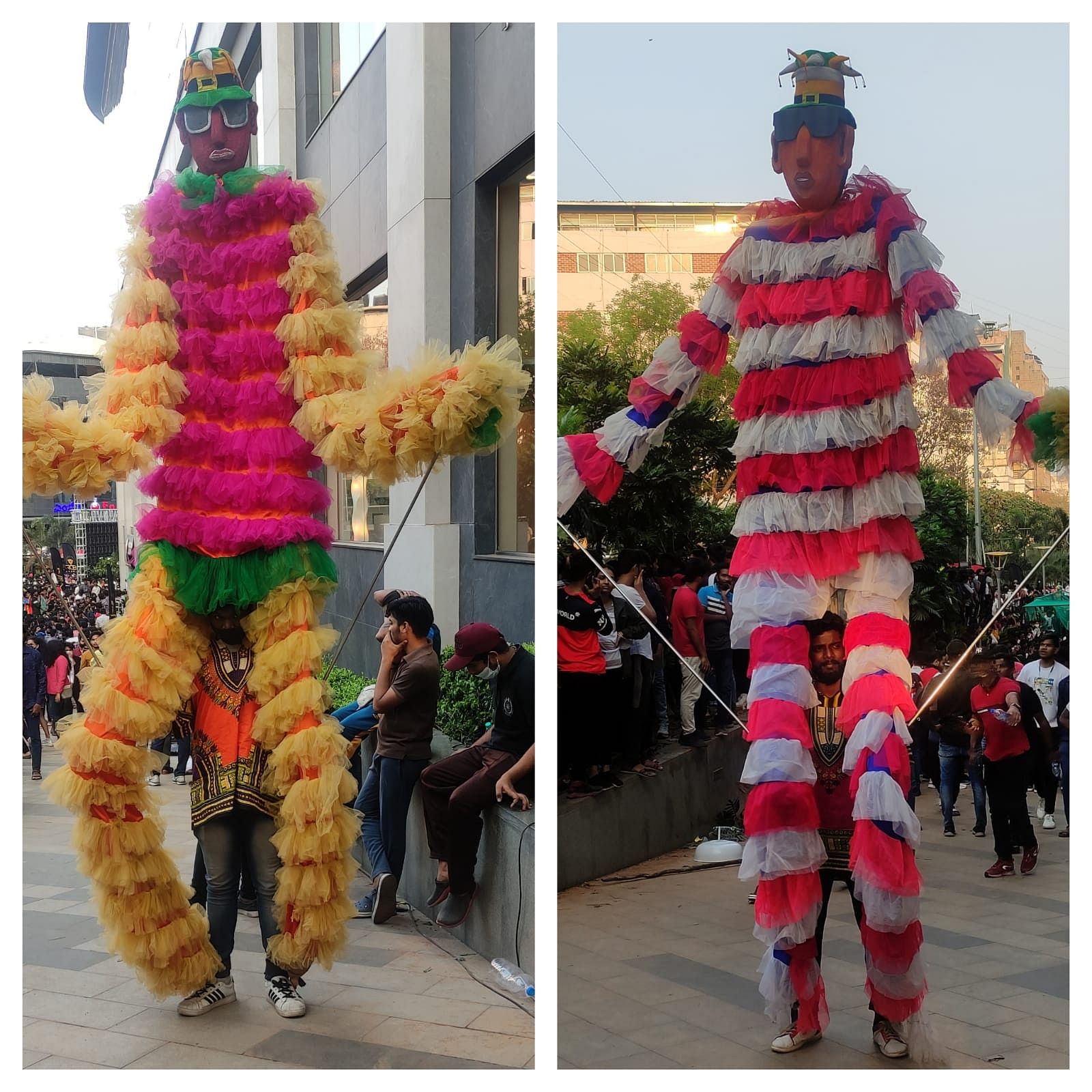
At a gathering of a sea of cricket fans on Church Street recently, two figures towered them all. Quite literally. These were ‘tall man puppets’, artistes who strap gigantic male figurines to their back and animate them manually. These puppets weigh 18-20 kg and a gush of wind can throw the puppeteers off balance and hurt their backs badly.
“We have taken out these puppets for the first time since the pandemic broke out,” Anthony Das, head of this troupe, told Metrolife. “I hope the tough times are over,” he comments on the heavy blow the Covid crisis has dealt on the live events industry and its artistes.
They had it tougher, he believes. People who perform carnival acts like tall man puppet, invisible man, mirror man, balloon man, fire juggling, ‘Chinese dance’ or drumming are neither recognised by the government nor do they have trade unions, Anthony says. His senior in the field and a pioneer of some acts, Saravana Dhanapal, and events services provider Abdul K M also said they operate as informal groups.
As the ban on offline events stayed and their savings depleted, “friends” in the events industry helped out with ration and medical expenses, and lent Rs 500 to Rs 1,000 on and off. Owners of the godown where they store their equipment waived off the rent. They sold some equipment to arrange money.
These artistes are a mixed bunch — college-goers to IT employees; youth from slums to middle-class neighbourhoods; some come for money, some for a hobby. “I had 15-20 boys in my troupe. But during the pandemic, many became delivery agents, painters and autorickshaw drivers,” says Anthony, 30. “Some have taken up electrical and construction work,” adds Saravana. A few have turned to farming or selling groceries, Abdul informs.
The smaller pool of talent is not their biggest worry though. It is the lack of big events and money.
Saravana, whose group Agnii Art For All has trained over 250 entertainers, including Anthony, says, “We are doing small acts here and there. Since we are resuming, we can’t demand big money (from organisers). Earlier, we would charge Rs 50,000 for a drumming performance by a big group. Now, we get Rs 30,000. Previously, we would make Rs 20,000 for individual acts, now just Rs 7,000.”
Anthony, who runs Jungle Djembe Music and Entertainers, says before the pandemic, they would perform at 15-20 venues a month — at concerts, apartments, birthday parties and marriage functions. That has become a trickle now. The ‘tall man’ act of two-three hours would fetch them Rs 60,000-Rs 70,000. Now they make Rs 20,000 for three times the duration, which he compares to “pocket money.”
Plus, old roadblocks remain. “We don’t have a studio or ground to practise, especially stilt-walking or tall man puppets that require space. We practise at the venue an hour or two before the event,” says Anthony. Saravana adds, “We practise the ‘tall man’ in parking lots or basements.” To put things in context, Abdul says the tall man puppet is “a new concept to Bengaluru”. Anthony recently unveiled his ‘tall woman puppet’ at a flea market, a work that cost him Rs 25,000 and took four to five months to create.
Despite the many odds, some continue in this field for the love of arts and their audience. “I was a flower-seller but thanks to my talent, I have travelled and performed across the world. It has been a fulfilling life,” says a content Saravana, 37.